CROSSING DIVIDES
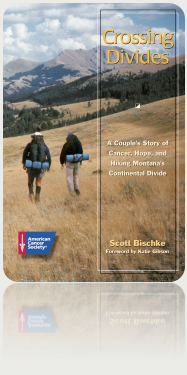
A
Couples' Story of Cancer, Hope, and
Hiking Montana's
Continental Divide
Synopsis
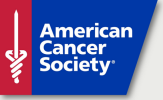
CROSSING DIVIDES artfully blends Scott Bischke and his wife Katie Gibson's agonizing
struggle against Kate's advanced, recurrent, "terminal" cancer with the story of
their three month, 800+ mile hike along the Continental Divide Trail across Montana.
Numerous themes and parallels weave through the book. Several encounters with grizzly
bears, for example, provide an avenue for metaphorical comparisons between the fear
of grizzlies and the fear of cancer. Similarly, Kate's ability to persevere through
the toils of a long- distance hike provides a constant parallel to her ability to
persevere against cancer. Other themes include the importance of a dogged spirit
in battling cancer and the importance of wild country in revitalizing the soul.
As folksinger and long-distance hiker Walkin' Jim Stoltz has said of CROSSING DIVIDES,
"This book proves that focusing on each day, and just putting one foot in front
of the other, CAN get you to your goal. It's a ray of sunshine and a boost of hope
for us all." (Sadly, Walkin' Jim has since passed away from cancer; those who
knew him miss his spirit and love of the wild deeply.)
The author is honored that CROSSING DIVIDES is published by the
American Cancer Society.
Author Comments
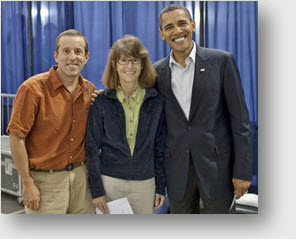
CROSSING DIVIDES speaks to two defining events in Kate and my life. The first, Kate's recurrent
cancer, continues to be a focus of the life we live, and to provide the limitations and opportunities we are blessed
to live within. The second, long distance hiking, walking 800+ miles across Montana,
was a direct outgrowth of our desire to live live
substantial lives again once the moment-by-moment ravages of cancer had abided. The book has
been an incredible rallying point for us, a way for Kate and me to meet and talk with others fighting
to live on in the face of cancer. And we have continued to hike, completing the full Continental Divide Trail now
from Canada to Mexico, working on the Pacific Crest Trail, and building almost every time of travel we have--be it Down Under,
Europe, England, South America, and beyond--around a long distance backpack trip.
We--largely I--have given talks across the country, to groups ranging from two to 7,000 people, the
latter being at an American Cancer Society rally on the Mall in Washington DC. Every single time we talk,
I pray for one thing: that our words, that our story, that Kate's indomitable spirit may help one person
listening deal with how cancer or some other strife is impacting their lives. I pray that Kate's story might give them
hope.
CROSSING DIVIDES has brought some unique happenings to our lives. Because of our great difficulties with
health insurance, Kate was asked to introduce President Obama at a Town Hall meeting in Bozeman in 2009. Quite an
honor, quite a man, and later she was invited twice to attend health-care associated presidential events, including
sitting behind Michelle Obama as the President addressed a Joint Session of Congress.
After that address, President Obama showed great presence, introducing Kate to
Michelle without any help from an aide, including saying (and how can such a man have room in his head to remember these things?!),
"Michelle, this is Katie Gibson. Her husband is the one who wrote the book about their experience with her cancer."
So those are a few thoughts about this most important of all books to Kate and me. I'd like to include
the book's foreward here, because it shares Kate's thoughts on CROSSING DIVIDES.
KATIE GIBSON'S FOREWARD TO CROSSING DIVIDES
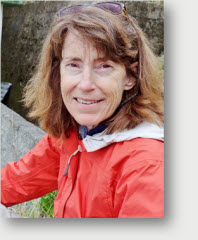
It’s been a month since my husband Scott and I got home from another summer of hiking—this
time down the Continental Divide Trail (CDT) of Colorado. We completed the Wyoming
CDT last year, and now we only have to walk one more state—New Mexico—to complete
the 3,100-mile trail. During this summer’s hike we had some amazing animal encounters,
including seeing a herd of 150 elk running over the grassy divide, and spotting
bears, coyotes, a few moose, and a badger. Our hike through Colorado often followed
right along the divide ridge and took us over peaks of 13,000 and 14,000 feet.
After cancer and recurrent cancer, I feel lucky just to be alive, much less able to hike down this wonderful
trail through the Rockies. At first it was hard to accept that cancer had been thrust
into my life. Once, after I was diagnosed, I walked out of a movie theater feeling
happy, then suddenly remembered that I supposedly only had a short time to live.
My heart sank to its lowest possible level and I felt a sense of hopelessness. There
was no way to prepare for such a drastic change in my outlook on life. I wanted
a reason to be happy, but the cancer acted like an anchor, weighing me down.
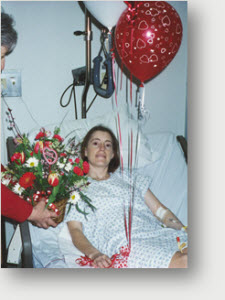
Some doctors suggested that I consider not having treatment because they believed my cancer could not be
cured. Others advised that I pursue various treatments. There were both optimists
and pessimists around me, and in the end I had to weigh all the research, opinions,
and my own gut feelings in order to decide which direction I wanted to go in. That
is one idea I hope you will take away from this book: You and only you are responsible
for deciding your path.
Because several of the cancer books I read while exploring treatment options suggested doing visualization,
I thought I would give it a try. One day I visualized myself getting well—I saw
all of the cancer cells dying, my body’s health taking over, and visualized myself
completely healthy again. All of a sudden I felt a wave of freedom, as though I
could actually do something about getting well. The something I could do was to
believe in the possibility that I could get well. After that realization I felt
so much happier. I decided that living with possibility was better than living without
hope.
Scott and I received a lot of support from the people around us. The doctors and nurses who took care of
me during cancer treatments acted in truly kind ways. Our friends spoke to us from
their hearts, making us feel loved. Our family members visited regularly and checked
on us to see if we were okay. All of these things helped us to be strong. Scott
was in this with me from day one. He never spoke in a way that separated him from
my medical problems. He always assumed that cancer was his problem to solve, too.
I felt his incredible support and that he was part of the ups and downs with me.
(Although I do admit feeling some jealousy when he got to go out for Mexican food
at dinnertime and I had to stay in my hospital bed. I try not to hold it against
him.)
In our lives before cancer, Scott and I loved doing almost anything outdoors. We felt enlivened and recharged
when we came home from a hike or a canoe trip or a bike ride in a beautiful place.
Memories of these kinds of places provided me with a mental refuge when I was working
toward getting well. In times of pain I mentally escaped to my favorite places in
the outdoors—hiking in the Rockies with the sun on my back, pedaling my bicycle
on a dirt road through the New Zealand bush, or sea kayaking down an awesome river
in Alaska seeing bear, salmon, and seals. If I could get back outside again, I thought,
breathe fresh air, and feel the warmth of the sun, I would appreciate it even more
than I ever had before.
People get their strength in many different ways. Sometimes remembering a great experience, thinking of
a peaceful place, or dreaming of how you’d like things to be in the future can make
you feel better. I hope that you will find your own dream to hold on to and that
this dream will help you get through treatment and on to living.
It was a blessing that we were able to hike down the Continental Divide Trail of Montana after my cancer
experience. The hiking parts of this story show the joy (and sometimes exhaustion)
we felt as we made our way through Montana. In the first few days we were in awe
of just being out there. After a couple of bear encounters we felt fear and questioned
why we were there. Maybe it sounds crazy for us to have spent years getting me well
from cancer, only to go out into grizzly bear country. But we wanted to be back
in the wild country that I dreamed of when things were at their worst.
So many events and emotions are tied up together in my cancer experience over the last nine years. I want
to share that experience in an effort to help others, especially those who might
be dealing with cancer or supporting someone with cancer. You may feel hopelessness,
fear, impatience, and anxiety over your treatment, as I did. Please know you’re
not alone. In the story that follows, Scott shares our emotions and dreams; perhaps
you will relate to them. Scott tells our story carefully, at times humorously, reflecting
as closely as possible what happened. He shares his thoughts and feelings through
the story and weaves in mine. My hope is that reading about our experience will
help you better deal with how cancer has affected your life.
When battling cancer, I wished for a simple set of rules to live by, but there were none. I had to find
my own path, and I continue to do so today. I wish I could hand you a recipe for
getting well, but I can’t. What I can do is, with Scott, share our story in hopes
that you will find similarities to your own situation and somehow gain hope and
inspiration. My biggest hope is for you to be empowered to find out the information
you need, to make decisions as best you can, and to not be afraid.
I realized during my cancer experience that each of us has a hundred times more strength than we realize.
This strength helps us get through seemingly impossible moments. May you find this
strength and use it to guide you along your path to well-being.
--Katie Gibson
 Back to top
Back to top